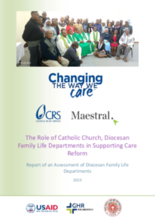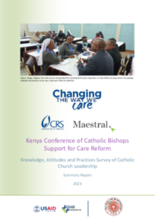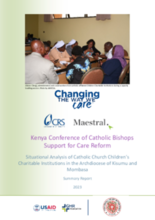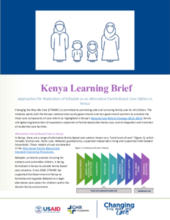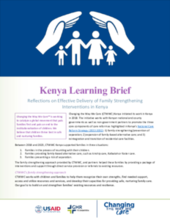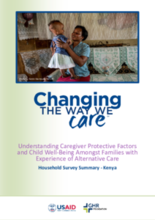This country page features an interactive, icon-based data dashboard providing a national-level overview of the status of children’s care and care reform efforts (a “Country Care Snapshot”), along with a list of resources and organizations in the country.
demographic_data
childrens_living_arrangement
children_living_without_bio
adoption
social_work_force
key_stakeholders
Key Stakeholders
Add New DataOther Relevant Reforms
Add New Datadrivers_of_institutionalisation
Drivers of Institutionaliziation
Add New Datakey_research_and_information
Key Data Sources
Add New DataChildren's Act, 2022 (Kenya)
Prevalence and number of children living in institutional care: global, regional, and country estimates
Social Protection and Disability in Kenya
Kenya Social Protection Sector Review
Country Care Review: Kenya
Child Developmental Disabilities, Caregivers’ Role in Kenya and Its Implications on Global Migration
Research findings on Alternative care system in Kenya for children without parental care
Charitable Children Institutions in Kenya: Factors Influencing Institutionalization of Children
Acknowledgements
Data for this country care snapshot was contributed by consultants with Maestral International.
Displaying 31 - 40 of 447
The 2023 assessment of Diocesan Family Life Departments (FLDs) in Kenya, conducted by the Kenya Conference of Catholic Bishops (KCCB) in collaboration with Changing the Way We Care℠ (CTWWC), highlights the Church’s critical role in advancing care
In 2023, the Kenya Conference of Catholic Bishops (KCCB) conducted a Knowledge, Attitudes, and Practices (KAP) survey, in partnership with Changing the Way We Care℠ (CTWWC), to assess the readiness of Catholic church leadership and workers i
This study aimed to gather data on Catholic Church Children’s Charitable Institutions (CCI) operations in Kenya, the children they serve, and the challenges they face, to inform future care reform strategies.
This learning brief explores the formalization and replication of Kafaalah, an Islamic practice of caring for orphans and vulnerable children, as an alternative family-based care option in Kenya.
This learning brief documents the process of care reform policy development and financing improvements in Nyamira County, Kenya, following the enactment of the Child Policy and the Persons with Disabilities Act, 2023.
A key feature of CTWWC’s theory of change is building evidence on children's care and reform, particularly regarding reintegration from residential care, transitions to family-based care, and preventing separation.
This webinar looked at case management for preventing family separation in Kenya, exploring the role that case management can play in prevention and the tools and strategies for effective case management with vulnerable families.
The Government of Kenya, through partners and other stakeholders, is scaling up the National Care Reform Strategy that seeks to transition about 85,000 children in more than 900 institutions to family and community-based care.
The program to reunite children living in care homes with families is now ready for national rollout following successful preliminary trials in 13 of the 47 counties.

